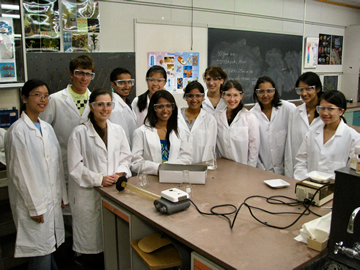 |
New Jersey Governor's School in the Sciences at Drew University |
 |
NJGSS Links |
|
| Team Projects | |
| NJGSS Home | |
| About NJGSS | |
Related Links |
|
| Drew University | |
2009 Team 3 |
||||||||
INHIBITORY EFFECTS OF Camellia sinensis (GREEN TEA) ON Streptococcus mutans Richad Becker, Sarah Hirsh, Emily Hu, Alisha Jamil, Sheryl Mathew, Ken Newcomb, Samana Shaikh, Dina Sharon, Vasiliki Triantafillou, Vivian Yeong Advisor: Mrs. Rachel Sandler |
||||||||
ABSTRACTGreen tea ( Camellia sinensis ) contains polyphenolic catechins reported to exhibit significant antimicrobial properties. This study tested green tea at a higher concentration against Streptococcus mutans , a common cariogenic bacterium. An in vitro study using paper disk diffusion determined that green tea at higher concentrations brewed at 90ºC proved most efficient in the inhibition of bacterial growth. A minimum inhibitory concentration (MIC) test was also conducted to determine pharmacologically effective concentrations of green tea. Although there were signs of contamination, plates inoculated with green tea clearly contained less growth than the water control. A mouth swabbing study was performed with green tea, Listerine ® , and water, where only the mouths rinsed with Listerine ® showed slightly less bacterial growth. Finally, several brands of mouthwashes were tested for their comparative efficacies against S. mutans . A wide range of potencies was observed, with mouthwashes containing cetylpyridinium chloride as most effective. Green tea, at a concentration of 40 mg/mL, brewed at 90° C at 5, 20, and 40 minutes, was determined to be moderately effective against S. mutans. Further studies are required to conclusively determine the specific conditions for optimal inhibition and thus, practical use. |
||||||||
|
||||||||
